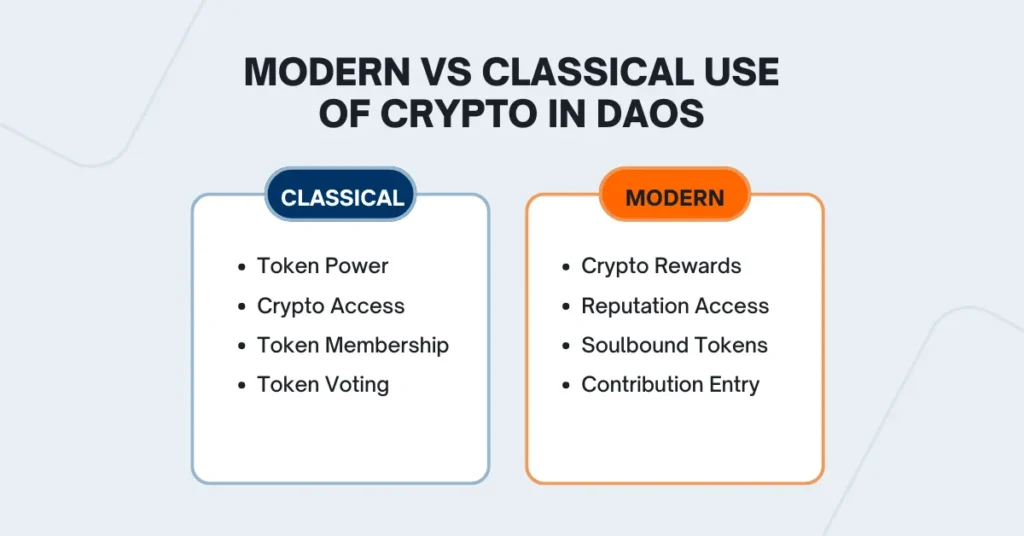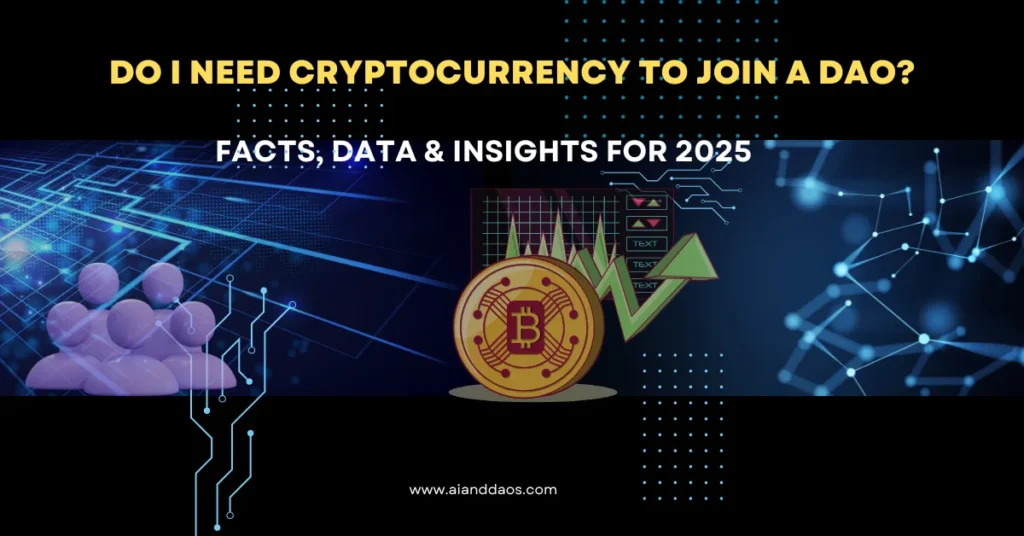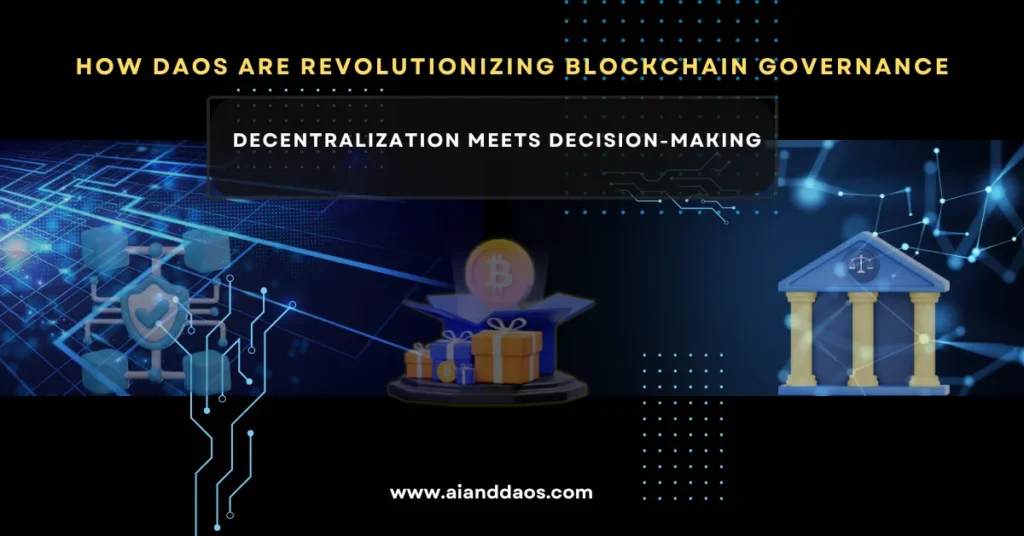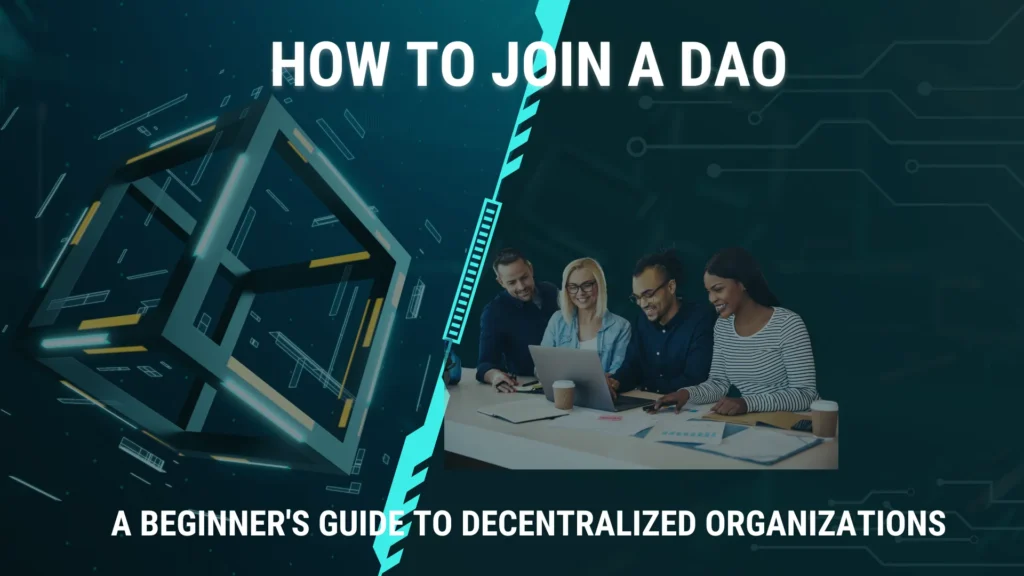When you hear “DAO,” you probably think crypto. Tokens, wallets, and complicated stuff. But that’s not the whole story anymore.DAOs started with crypto. You needed tokens to join or vote. Now things are changing.
More DAOs are opening up. You don’t need crypto to get involved.
Writers, designers, thinkers — all kinds of people are joining. These DAOs want your skills, not your tokens.
In this article, we’ll show how DAOs are getting more inclusive.
And how you can join in — even without any crypto experience.
So now, crypto isn’t a barrier — it’s a utility. It’s not about buying in; it’s about earning, accessing, and building trustlessly.

Why We Needed Cryptocurrency to Join a DAO (Traditionally)
You needed cryptocurrency because it gave you membership, power, and access — it was the entry ticket to everything inside the DAO.
To Prove Membership
Crypto tokens acted like a key. If you held the DAO’s token in your wallet, you were considered a member. No tokens? No access.
To Vote on Decisions
Tokens weren’t just for show — they gave you voting power. The more tokens you had, the more influence you had over proposals, budgets, and roadmaps.
To Fund the DAO
Early DAOs raised funds by selling tokens. Members bought in with crypto (usually ETH), and that money went into the DAO’s treasury for future use.
To Use the Tools
Most DAO tools were built on blockchain. So to log in, vote, or contribute, you needed a crypto wallet connected — and that meant holding some kind of token.
Why We Still Use Cryptocurrency to Join DAOs (Modern Reasoning)
To Reward Work
DAOs use crypto to pay contributors — writers, devs, designers, etc. It’s fast, global, and automated.
To Unlock Access
Holding tokens or NFTs can unlock private groups, tools, or voting rights — like a digital membership pass.
To Keep It Decentralized
Crypto removes middlemen. Smart contracts handle payments, voting, and rewards without needing banks or platforms.
What is a DAO and How Does it Work?
A DAO is basically an online group with no boss at the top. Instead, decisions are made by the community together.
Everything in a DAO runs on smart contracts — rules written into code and stored on the blockchain (kind of like a digital record book that no one can mess with). These contracts automatically carry out decisions, making everything open, fair, and trackable.
DAOs are run by the people, not a single leader. Members make the big decisions together — like where funds go or which ideas move forward.
Voting usually happens through tokens. Think of them like digital votes. The more tokens someone holds, the bigger their voice in the decision-making.
In a DAO, the community calls the shots. Members vote on everything — from funding ideas to picking what gets built next. Votes are powered by tokens. More tokens = more say.
How Decentralized Organizations-DAOs are Revolutionizing Blockchain Governance
Why DAOs Started Off So Crypto-Centric
Governance Tokens = Early Power
Early DAOs gave power to people who held tokens. Token holders made the decisions, voted on proposals, and controlled the direction of the DAO.
Crypto Wallets = Digital ID
Your crypto wallet acted as your key to enter. It held your tokens, tracked your votes, and proved your membership in the DAO.
Tech-First, Investor-Heavy Beginnings
DAOs were built by early Web3 developers and crypto investors. They designed systems around code, tokens, and finance — not around broad, everyday participation.
What’s Changing in 2025: New Paths, New People
DAOs are shifting from tokens to talent
In the past, holding tokens gave you access and voting power. Now, DAOs are looking for skills — not wallets. They care more about what you bring to the table than how much crypto you hold.
Skill-based governance is on the rise
DAOs are starting to reward actual contribution. Whether you write, code, design, or organize — your work helps shape decisions. Some DAOs are even testing non-token voting models based on reputation or proof of work.
Real-world examples leading this shift
- Coordinape lets teams reward each other with tokens based on actual effort.
- Wonderverse offers bounty boards where anyone can contribute and earn — no token ownership needed.
- CharmVerse uses tools like access credentials and contribution tracking to include non-crypto users.
Modern vs. Classical Use of Crypto in DAOs
Classical Use: Token = Power
In early DAOs, tokens controlled everything.
- Tokens = Entry: You had to buy tokens to join.
- Tokens = Voting Rights: More tokens meant more say.
- Tokens = Status: Your influence depended on how much crypto you held.
Modern Use: Crypto as a Tool, Not a Gatekeeper
Now, DAOs use crypto in more flexible, creative ways.
- Reward System: Members earn tokens by contributing (not just buying in).
- Payment Method: DAOs pay contributors in crypto for their work.
- Access Key: Some DAOs use tokens or NFTs to unlock tools, calls, or roles.
Reputation-Based & Hybrid Models
New systems combine reputation, credentials, and non-transferable tokens (like soulbound tokens).
- These models reward consistency, trust, and actual contributions.
- Power comes from what you do — not what you hold.
Today, it’s not just about buying tokens — it’s about earning your place through value.
Ways to Join a DAO Without Cryptocurrency
1. Contribute Your Skills First
You don’t need to buy tokens to join — you can earn your place. Many DAOs let you onboard by contributing as a designer, developer, writer, marketer, or community manager. It’s talent-first, not token-first.
2. Complete Bounties and Tasks
Platforms like Wonderverse and Dework offer open tasks and bounties. You choose a task, complete it, and get paid in tokens — all without needing to own any crypto beforehand.
3. Use Community Credentials & Reputation
Some DAOs use soulbound tokens, badges, or reputation systems instead of traditional crypto. These prove your involvement and unlock access — think of them like your DAO resume.
4. Join the Conversation with Off-Chain Voting
DAOs often use tools like Snapshot or Discourse for discussions and decisions. These don’t require tokens or wallets to start participating — just your input and ideas.
You don’t need crypto to belong — just skills, initiative, and a willingness to get involved.
Pros and Cons of Joining a DAO Without Cryptocurrency
✅ Pros
- Easy access: No need to buy crypto or set up a wallet just to get started.
- Low barrier for newcomers: Anyone can contribute, even without tech or Web3 knowledge.
- More diverse communities: Opens the door for creatives, educators, marketers, and non-technical contributors.
Cons
Limitedcontrol: In manyDAOs, you stillneedtokens to have a say in bigdecisions.
Some features or groups might requiretokenslateron.
Buildingreputation could taketime: Without tokens, you might need to prove your value before getting a biggervoice.
You can join without crypto, but your impact might comeslower — unless the DAO reallycares about what you contribute, not just how manycoins you have.
Insights, Stats & DAO Trends to Watch (2025)
DAO Growth Is Surging
- Over 10 million users now participate in DAOs — triple the number from 2022.
- Around 1 in 3 new members joined without owning any crypto at the start.
- DAOs collectively manage more than $30 billion in on-chain treasury assets.
Inclusion Is Increasing
- Recent reports show 42% of contributors in newer DAOs come from non-technical roles — writers, designers, educators, ops.
- Women- and youth-led DAOs like HerDAO, Meta Gamma Delta, and EduDAO are bringing new voices to the space.
- More DAOs are using reputation-based onboarding instead of wallet-based entry.
Voices from the Field
“We don’t care if you have tokens. If you show up and contribute, you’re one of us.”
— Core Contributor, Wonderverse
“DAOs are finally moving past the crypto gatekeeping. It’s about the value you add.”
— Founder, CharmVerse
“I joined through a bounty. Didn’t hold any tokens. Now I manage a working group.”
— Community Member, Coordinape
Explore our guide on Beginner-Friendly DAOs.
What People Get Wrong About DAOs and Cryptocurrency
Let’s clear up some of the most common misunderstandings that stop people from getting involved.
Myth 1: You need to be rich in crypto to join a DAO.
Truth: Nope. Many DAOs now welcome contributors without requiring token ownership. You can join by doing meaningful work — writing, building, designing, organizing — and earn tokens as you go.
Myth 2: DAOs are only for tech people.
Truth: Not anymore. While DAOs began in the developer crowd, 2025 DAOs actively seek creatives, marketers, educators, and community builders. DAOs run like remote teams — not just code labs.
Myth 3: If you don’t hold tokens, you don’t matter.
Truth: Influence is shifting. Some DAOs use reputation systems, soulbound tokens, or community credentials to give decision-making power based on contributions, not holdings.
Myth 4: DAOs are all about money and speculation.
Truth: Yes, many DAOs manage funds, but a growing number are mission-driven — focused on education, activism, art, community building, and open-source projects.
Myth 5: DAOs are hard to use or understand.
Truth: Many DAO platforms today are beginner-friendly, no-code, and guided. Tools like Wonderverse, DAOhaus, and CharmVerse make onboarding smooth — even if you’ve never touched crypto.
TL;DR: DAOs aren’t just for crypto pros anymore — they’re for anyone ready to contribute, collaborate, and build something meaningful.
The Future of DAOs and Cryptocurrency
The future of DAOs is one of inclusivity and innovation. As the ecosystem matures, we can expect more DAOs to adopt tokenless models, making them accessible to a wider audience.
Predictions for the Next 5-10 Years
- Increased Inclusivity: More DAOs will prioritize reputation-based systems over token-based governance.
- Hybrid Models: Combining token-based and tokenless participation to cater to diverse audiences.
- Technological Advancements: Integration of AI and machine learning to streamline governance and decision-making.
The Role of Cryptocurrency in Future DAOs
The future of DAOs is all about inclusivity and innovation.
As structures grow more sophisticated, we can expect more DAOs to adopt tokenless models, making them more accessible to a wider audience.
Predictions for the Next 5-10 Years
Increased Inclusivity: More DAOs will focus on reputation–based systems rather than token–based governance.
Real-World Examples of DAOs Allowing Non-Crypto Participation
Non crypto participation means tokenless participation. Following are the DAOs with tokenless participation models:
- DAOstack: Focuses on reputation-based governance.
- Aragon: Offers flexible governance models.
- MakerDAO: Encourages participation through community forums.
Example: In 2023, DAOstack’s tokenless model onboarded thousands of participants, demonstrating the viability of reputation-based systems.
DAO In and Make Your Skills Count
You don’t need to be a crypto expert to join a DAO. Crypto is no longer a requirement — it’s just one of many tools.DAOs in 2025 are shifting from money-first to mission-first. They’re becoming communities of action, collaboration, and real-world impact — not just digital wealth hubs.
So whether you’re a designer, developer, writer, strategist, or someone full of ideas —There’s a place for you in the DAO world. And the best part?
You can start without holding a single token.
The future of work, creativity, and community is decentralized — and it’s wide open.



Pingback: 5 Top Beginner-Friendly DAOs for 2025 - aianddaos
Pingback: Aragon for DAO Governance: A Beginner’s Guide to Easy Setup
Pingback: Unlock Hidden Wealth: Proven Ways to Earn Tokens in DAOs !
Pingback: What is DAO Membership? | Explore Types, Benefits, and How to Join - AI and DAOs
Pingback: How to Join a DAO: Your Ultimate Beginner’s Guide